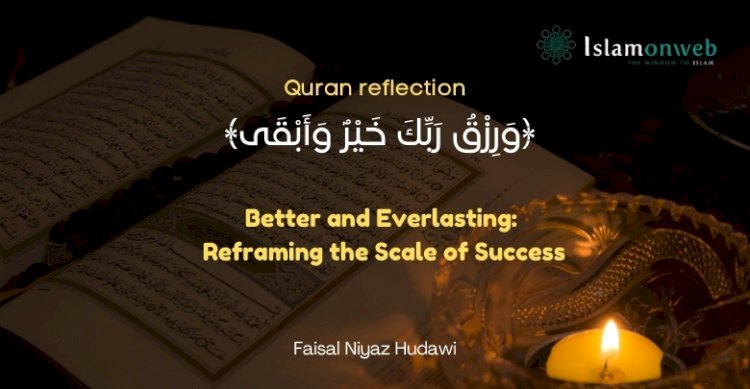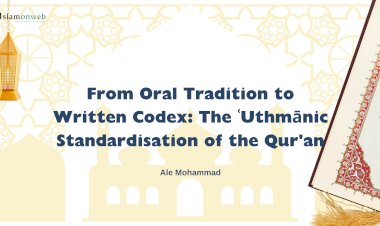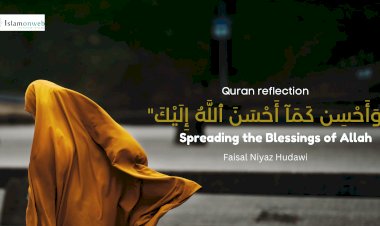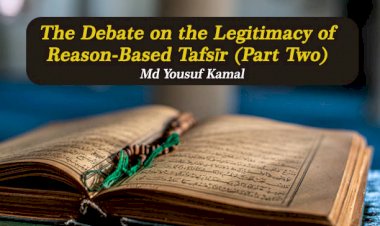﴾وَرِزْقُ رَبِّكَ خَيْرٌ وَأَبْقَى﴿ | Better and Everlasting: Reframing the Scale of Success
In a world where success is measured by wealth, influence, and the luxury one can afford, the pursuit of worldly gains has become a dominant obsession. Shelves are filled with books on how to be successful, how to make more money, how to build influence, and how to secure a powerful life. From early education to corporate strategy, the narrative is constant: invest in what brings material return. Facilities, status, networking, and visibility—these have become the new credentials of a “fulfilled life.”
But the Qur’an introduces a radically different scale.
﴾وَرِزْقُ رَبِّكَ خَيْرٌ وَأَبْقَى﴿
"And the provision of your Lord is better and more enduring." (Ṭāhā: 131)
This verse gently but firmly redirects our gaze away from what dazzles the eyes, and toward what nourishes the soul—a provision from Allah that is better and everlasting. It’s a call to reframe our understanding of success—not as the fleeting glitter of possessions, but as the enduring light of contentment, gratitude, and the pursuit of the Hereafter.
This āyah was revealed as a soothing balm to the Prophet ﷺ in the midst of his mission, facing the temptations and glitter of the world paraded before him. It is not just a message to him—it is a lesson for every believer: While what people flaunt may glitter, it fades. But what Allah ﷻ will provide in the hereafter it lasts. His rizq carries no regret, and no burden of showing off. It's a provision of both this world and the next.
﴿وَرِزْقُ رَبِّكَ خَيْرٌ وَأَبْقَى﴾ is part of one of the most powerful verses that turn hearts away from the fleeting glamour of this worldly life and redirect them towards the lasting rewards of the Hereafter :
﴿وَلَا تَمُدَّنَّ عَيْنَيْكَ إِلَىٰ مَا مَتَّعْنَا بِهِ أَزْوَاجًا مِّنْهُمْ زَهْرَةَ الْحَيَاةِ الدُّنْيَا لِنَفْتِنَهُمْ فِيهِ ۚ وَرِزْقُ رَبِّكَ خَيْرٌ وَأَبْقَىٰ﴾ (طه:131)
"And do not extend your eyes toward that by which We have given enjoyment to [some] categories of them, [it is but] the splendour of worldly life by which We test them. But the provision of your Lord is better and more enduring." (Ṭāhā 20:131)
This single verse is rich with spiritual instruction, structured into three key elements: a prohibition, a reason, and a truthful conclusion.
The Prohibition: “Do not extend your eyes…”
The command is addressed first to the Prophet ﷺ, yet it encompasses every believer. “Do not extend your eyes” is more emphatic than merely saying “do not look.” It implies a longing glance, a gaze filled with desire and attachment. It cautions against admiring or being inwardly attached to the worldly luxuries others enjoy—be they the disbelievers of Quraysh or the material elites of any time and place.
The word “azwājā” here means different categories or kinds of people. In essence, the verse is saying: “Do not covet the diversity of worldly adornments that We have temporarily distributed among various people.”
This insightful commentary by al-Zamakhsharī sheds further light on the Qur’anic command: “Do not extend your eyes toward what We have bestowed upon some of them of the splendour of worldly life…” (Ṭāhā 20:131). He explains that “extending the gaze” (مدّ النظر) implies more than a casual glance; it means a prolonged, desirous gaze born from admiration and wishfulness, as was the case with those who longed for the wealth of Qārūn and said, “Oh, would that we had like what was given to Qārūn! Indeed, he is one of great fortune” (al-Qaṣaṣ 28:79). But the people of knowledge corrected them, reminding, “Woe to you! The reward of Allah is better for those who believe and do righteous deeds.” (al-Qaṣaṣ 28:80)
Al-Zamakhsharī points out that fleeting or reflexive glances—those that happen involuntarily and are immediately turned away—are not blameworthy. But the natural inclination to gaze at luxury, especially with envy or longing, is what the verse warns against. This is why the command is expressed emphatically: “Do not extend your eyes…”—not merely “do not look.” It tackles what is often embedded in human nature: the desire to admire wealth and outward beauty.
What’s profound here is the spiritual advice from scholars of taqwā (God-consciousness), who insisted on lowering the gaze even from the buildings and possessions of the wicked and corrupt, for they often acquire such displays purely for the admiration of others. Anyone who stares at them fulfills their ego-driven aim and thus becomes an indirect contributor to their vanity.
The Reason: “...to test them through it.”
Allah tells us that the splendour and glamour of this life are not signs of success, but rather tools of trial. Wealth, status, fashion, and fame—all these are adornments of this life meant to expose what lies within the hearts of people. Some are deceived by them and become arrogant; others remain grateful and detached. The real test lies not in what you have, but in how your heart reacts to what you see.
The phrase {لِنَفْتِنَهُمْ فِيهِ} – “that We may test them thereby” carries profound meaning. The lām (ل) here, according to al-Ṭabarī, is lām al-taʿlīl (the lām of reason or purpose)—indicating that Allah grants the worldly pleasures to some as a means of testing them: Will they be grateful or ungrateful? Will they recognise these blessings as gifts from their Lord and respond with humility and obedience—or will they become arrogant, self-indulgent, and forgetful of the Giver?
Al-Ṭabarī elaborates: “We grant them these provisions only to try them with it, for it is fleeting and deceptive—vanity that soon perishes.” The possessions, luxury, and status are not rewards in themselves, but tools of trial in disguise. What seems like honour may, in reality, be a hidden trap.
Meanwhile, Ibn ʿĀshūr offers a different yet complementary insight. He interprets the lām here as lām al-ʿāqibah (the lām of consequence)—similar to how the Qur’ān describes Pharaoh’s family picking up baby Mūsā:
“Then the family of Pharaoh picked him up, so that he would become for them an enemy and a source of grief” (al-Qaṣaṣ 28:8).
Their intent was something else, but the outcome was unexpected. Likewise, Allah’s provision to the arrogant may not be given to honour them, but its end result is humiliation and loss—a divine law that what is temporary and worldly will always fade, whereas what is with Allah remains.
Above all, it is crucial to recognise that Allah’s granting of wealth, children, or worldly success to the disbelievers is not a sign of His pleasure, but part of His plan for establishing the proof against them. As Allah says:
“Do they think that because We provide them with wealth and sons, We hasten for them good things? Rather, they do not perceive.” (al-Mu’minūn 23:55–56)
Our perception shapes our pursuit—if we view worldly success as the ultimate goal, we risk being blinded by its glitter; but when our perspective is guided by īmān, we begin to see that what is beyond.
This incident, narrated in Ṣaḥīḥ Muslim, offers a profound lens through which we understand the divine statement: ﴿وَرِزْقُ رَبِّكَ خَيْرٌ وَأَبْقَى﴾ – “And the provision of your Lord is better and more lasting” (Ṭāhā: 131).
When ʿUmar ibn al-Khaṭṭāb رضي الله عنه entered upon the Prophet ﷺ and found the Messenger of Allah resting in a house with nothing in it except three untreated animal hides, his heart ached. Moved by the simplicity of the Messenger ﷺ, he said, "Make duʿāʾ to Allah, O Messenger of Allah, to grant your Ummah abundance. For indeed, Persia and Rome have been granted prosperity, and they do not even worship Allah!"
But the Prophet ﷺ, whose heart was firmly tied to the Hereafter, sat up and replied with spiritual clarity:
"Are you in doubt, O son of al-Khaṭṭāb? Those are people whose good things have been hastened for them in the life of this world."
This moment is not just a personal exchange—it is a revelation of perspective. Where ʿUmar رضي الله عنه saw deprivation, the Prophet ﷺ saw purpose. Where others saw scarcity, he ﷺ saw eternal sufficiency. His contentment wasn’t in the adornments of dunya, but in the assurance of Allah’s enduring rizq.
Umar رضي الله عنه was overwhelmed with realisation and humility. Recognising the truth in the Prophet’s ﷺ words, he immediately responded:
"استغفر لي يا رسول الله"
“Seek forgiveness for me, O Messenger of Allah.”
Do not be deceived by outward glitter. Even the wealth and splendour of this world, when devoid of īmān, may be nothing more than a divine test or a trap wrapped in silk. The lasting reward—the rizq of your Lord—is that which nourishes the soul, lifts the heart, and lasts beyond the grave.
The Conclusion: “...And the provision of your Lord is better and more lasting.”
This is the divine reminder and ultimate reassurance: True provision does not lie in material possessions, but in what is granted by Allah of faith, tranquillity, contentment, and eternal reward. His provision includes spiritual insight, guidance, barakah (divine blessing), and what awaits the believer in Jannah—that which neither eye has seen nor ear has heard, nor has it occurred to the heart of anyone.
The third and final segment of this powerful verse brings clarity to the heart: {وَرِزْقُ رَبِّكَ خَيْرٌ وَأَبْقَى} – “And the provision of your Lord is better and more lasting.” Here, rizq (provision) refers not to worldly wealth but to the reward and sustenance of the Hereafter—eternal blessings prepared for the righteous. Unlike the fleeting allure of worldly riches, the reward of Allah is untouched by time or decay. As Allah says elsewhere:
{مَا عِندَكُمْ يَنفَدُ وَمَا عِندَ اللَّهِ بَاقٍ} – “Whatever you have will perish, but what is with Allah will remain” (al-Naḥl 16:96).
Imam al-Qurṭubī beautifully summarises this contrast: “The reward from Allah for those who are patient and do not cling to worldly distractions is more worthy because it remains, while the world vanishes.” And this echoes another divine truth:
{ثَوَابُ اللَّهِ خَيْرٌ لِمَنْ آمَنَ وَعَمِلَ صَالِحًا} – “The reward of Allah is better for those who believe and do righteous deeds” (al-Qaṣaṣ 28:80).
Al-Rāzī offers yet another dimension—he suggests that even a little provision in this world, if accompanied by contentment and obedience, is far superior in outcome. A modest life lived in the obedience of Allah is, in its essence, “better and more lasting” than opulence tied to heedlessness or sin.
And there is also deep meaning in the phrase “Provision of your Lord”—the iḍāfah (attribution) of provision directly to al-Rabb (the Lord) is an honour in itself. For though all rizq is ultimately from Allah, the provision tainted by ingratitude or arrogance—as often seen among the defiant—is not worthy of being linked to His name in the same way. What your Lord gives, nurtures, and blesses for the believers is pure, preserved, and an eternal treasure beyond all earthly measure.
In conclusion, this part of the verse realigns our hearts: let your gaze rest not on what glitters briefly in the hands of others, but on what remains—رزق ربك خير وأبقى.
In Summary:
- The wealth and glamour that many envy are not always divine favours, but can be forms of divine tests or preludes to downfall.
- What Allah provides is not always a sign of love—it may be a trial to reveal what truly resides in one’s heart.
- Our focus must remain on eternal provision—رزق ربك خير وأبقى—“the provision of your Lord is better and more lasting.”
The wisdom of the pious has always echoed the Qur’anic call to detach from the glitter of this fleeting world and seek what is eternal. As Abū al-Dardā’ رضي الله عنه said: “The world is the dwelling of the one who has no true home, and the wealth of one who has no real wealth. It is gathered by one who has no reason.” And ʿĪsā ibn Maryam عليه السلام powerfully advised: “Do not take the world as a lord, lest it takes you as its slave.”
This is the spiritual essence of ﴿وَرِزْقُ رَبِّكَ خَيْرٌ وَأَبْقَى﴾ —“And the provision of your Lord is better and more lasting”—a verse that draws a clear boundary between what dazzles and what endures, between the fleeting tests of wealth and the eternal treasures of faith and trust in Allah.
A Powerful Duʿā’
Before concluding this reflection, let us revisit a profound duʿā’ the Prophet ﷺ used to frequently teach his companions—one that beautifully ties into our discussion today on ﴿وَرِزْقُ رَبِّكَ خَيْرٌ وَأَبْقَى﴾ (“And the provision of your Lord is better and more lasting”).
He ﷺ would say:
“اللَّهُمَّ اقْسِمْ لَنَا مِنْ خَشْيَتِكَ مَا يَحُولُ بَيْنَنَا وَبَيْنَ مَعَاصِيكَ، وَمِنْ طَاعَتِكَ مَا تُبَلِّغُنَا بِهِ جَنَّتَكَ، وَمِنَ الْيَقِينِ مَا يُهَوِّنُ عَلَيْنَا مَصَائِبَ الدُّنْيَا، وَمَتِّعْنَا بِأَسْمَاعِنَا وَأَبْصَارِنَا وَقُوَّتِنَا مَا أَحْيَيْتَنَا، وَاجْعَلْهُ الْوَارِثَ مِنَّا، وَاجْعَلْ ثَأْرَنَا عَلَى مَنْ ظَلَمَنَا، وَانْصُرْنَا عَلَى مَنْ عَادَانَا، وَلَا تَجْعَلْ مُصِيبَتَنَا فِي دِينِنَا، وَلَا تَجْعَلِ الدُّنْيَا أَكْبَرَ هَمِّنَا، وَلَا مَبْلَغَ عِلْمِنَا، وَلَا تُسَلِّطْ عَلَيْنَا مَنْ لَا يَرْحَمُنَا.”
(Narrated by al-Tirmidhī and others, ḥasan saḥīḥ)
This part of duʿā’ ، وَلَا تَجْعَلْ مُصِيبَتَنَا فِي دِينِنَا، وَلَا تَجْعَلِ الدُّنْيَا أَكْبَرَ هَمِّنَا، وَلَا مَبْلَغَ عِلْمِنَا
which means “And do not make our affliction in our religion, and do not make this world our greatest concern nor the extent of our knowledge.”
This powerful supplication from the Prophet ﷺ encapsulates the longing of a heart that sees beyond the glitter of this fleeting world.
“And do not make our affliction in our religion” – meaning, do not test us in ways that harm our faith: not through corrupt beliefs, unlawful earnings, spiritual laziness, or sins that distance us from You. Any loss in life can be endured, but a loss in religion is a loss of everything. We ask Allah never to let us be shaken in our īmān, even if the world around us falls apart.
“And do not make the world our greatest concern” – do not let our lives revolve around the pursuit of wealth, fame, and status. Yes, a degree of concern for livelihood is natural and even required—but let it not be our biggest grief or highest aim. Rather, make our greatest longing the success of the Hereafter, and our deepest worry our standing before You.
“Nor the extent of our knowledge” – do not make our minds preoccupied only with worldly matters: business, careers, entertainment, and passing news. Instead, expand our hearts and intellects to reflect on the realities of the Hereafter, to seek beneficial knowledge—knowledge that draws us closer to Allah and prepares us for our eternal journey.
The words of this duʿā’ are not just requests—they are priorities. They realign the believer’s compass toward what truly matters. In a world where success is defined by wealth and visibility, this duʿā’ reminds us that real success is to leave this world with our faith intact and our hearts attached to the eternal.
In essence, this is the voice of the believer echoing the wisdom of the Qur’an:
Don’t be dazzled by the flowers of this life—what Allah has is better and forever.
Disclaimer
The views expressed in this article are the author’s own and do not necessarily mirror Islamonweb’s editorial stance.
























Leave A Comment